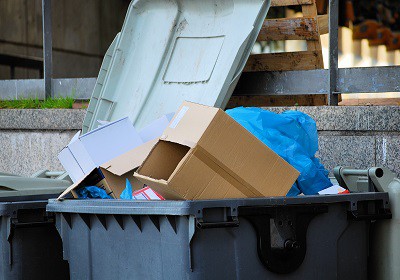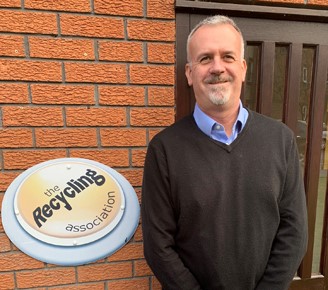Proposals in the extended producer responsibility (EPR) consultation to enable businesses to receive a rebate for packaging waste have caused concern in some sectors of the waste industry.
The proposals in the consultation estimate the cost of the system to be in the region of £1.5 billion. However, “analysis has indicated that it may be possible to reduce these costs through scheme design”.

Whoever controls the scheme will set a per tonne rate for commercial recycling collections, with rebates given for packaging (picture: Shutterstock)
Government is working on the assumption that payments for business waste recycling will be introduced from 2024.
The consultation sets out three payment mechanisms for the scheme, which will see businesses receive rebates, funded by producers, for packaging waste collected in order to bring the costs as “close to zero as possible”.
Concerns over competition have been raised by both Simon Ellin, the chief executive of the Recycling Association, and Paul Van Danzing, policy director of Wastepack. Ecosurety outlined in its response to the consultation that compliance schemes should play a central role in running the system because of their expertise.
Option 1
In short, under the first option, ‘a scheme administrator led’ mechanism, businesses disposing of packaging waste would receive a rebate from producers for recycling.
“This would result in a heavily discounted/free packaging waste collection service, where businesses used it as intended. This approach would operate within the existing collection framework, with waste management companies competing for customers,” the consultation says.
To enable this the scheme administrator would set a per tonne rate, or multiple rates to reflect different ruralities, business types and sizes. The per tonne rate set by the scheme administrator would broadly encompass the collection and sorting costs for mixed dry recyclables, net of material value.
Businesses would then receive an invoice explaining the cost of the dry packaging collection service, the rebate from producers they were entitled to and how to receive the full rebate.
Option 2

Defra hopes the potential of a rebate will lead to higher quality packaging for recycling from the commercial and industrial sectors (picture: Shutterstock)
Under the second option, called a ‘compliance scheme led payment mechanism’, the per tonne rate set by the scheme administrator would reflect collection costs only, net of material value, with sorting costs subject to agreement between the compliance scheme and the first receiver.
The compliance scheme would then pay waste collectors this rebate, who would then be required to pass the rebate back to their customers, detailing this on their invoice. The compliance scheme would then take responsibility for arranging any further sorting necessary before arranging the reprocessing to secure evidence to meet their members targets.
The consultation added: “Government would want to ensure all eligible businesses benefit from a free or very close to free service that is both reasonable and fair to the business and producers and ensure reporting by waste management companies enables this.”
Option 3
Under the third option, called ‘a compliance scheme-led free bin approach’ , all businesses would be entitled to free collection of packaging waste.
Any waste collector offering a packaging waste collection service to a business would have to offer that business a ‘free service’ for all its packaging waste.
It would be for individual waste collectors to specify the frequency, bin size and/or bin sharing requirements that may be necessary to for them to offer a free service in any given area and to compete with other collectors on this basis.
Businesses would then be able to choose to upgrade or enhance their service beyond what had been offered, for instance if they wanted a more frequent collection service than was on offer or did not want to share a bin.
Waste management companies would continue to be able to charge for the collection of non-packaging materials where co-collected.
However, they would be required to state the proportion of packaging collected, so it was transparent to a business what proportion of their mixed dry recyclate service had been provided at no charge.
The consultation added: “Government would like to explore further the extent to which such an approach would incentivise waste management companies to optimise service delivery”.
‘11th hour’
Simon Ellin, chief executive of the Recycling Association, said the association and its members were in favour of EPR and had been calling for it for a number of years. However, he said: “Nobody expected commercial and industrial waste to be included at the 11th hour.”
“Nobody expected commercial and industrial waste to be included at the 11th hour”
He added: “In this consultation, options two and three take away ownership of material from our members and instead places it in the hands of compliance schemes and arrange sorting and processing of this packaging. That could put a lot of people out of business.
“The concern we have is we can’t see added value that a compliance scheme with no experience in sorting and or relationships with global partners would bring. We understand compliance schemes have a role, as they need to secure evidence in a similar way they do now. There is a role for them in the data side of things.
“We believe the reason they are involved in this stage of proceedings is there is a belief there is a quality issue in commercial and industrial waste. However, this is only a tiny fraction of the problems we face with household waste collected.
“We’re not saying C&I waste can’t improve, but it only requires small changes. There is no need to completely rip up the system and to me, this seems rushed and will cause complete carnage.”
Mr Ellin called for the proposals to be put on hold once regulations around household waste were finalised, adding that this could then be revisited with the lessons learned.
Competition
Concerns over competition were also raised by Paul van Danzig, policy director at the compliance specialist Wastepack.
He said: “Some of the proposals in the consultation suggest that the ‘scheme administrator’, a not for profit private limited company, will be given powers to set the price to encompass the collection and sorting costs for dry mixed recyclables.
“Given the very strict anti-competition laws that exist, I cannot possibly see how any one company could dictate the price a waste management company receives for providing a waste collection service. It sounds to me that the consultation is suggesting a level of market manipulation – which is unlawful, I suspect that when reality bites, the EPR system we end up with, will be very much different to some of the measures laid out in the consultation.”
Response
Compliance scheme Ecosurety published its consultation responses on Friday (21 May) where it backed option 2.
Ecosurety said the expertise compliance schemes hold will be “essential for many of the activities listed such as reporting and administering financing. This will also allow enough scheme administrator resource to concentrate on strategic oversight and local authority payments”.
It added: “Given the plethora of responsibilities of the scheme administrator, it is impractical for it to undertake the activities within the business waste system.”
The post Concern over EPR business waste proposals appeared first on letsrecycle.com.
Source: letsrecycle.com Packaging





